When Dr. August Lovegren’s colleagues and family evacuated Jordan during the Six-Day War of 1967, he remained in the hospital to take care of patients. As Westerners were leaving the Middle East when the Gulf War started in 1991, August was on a plane headed to Yemen to participate in a short-term medical mission trip.
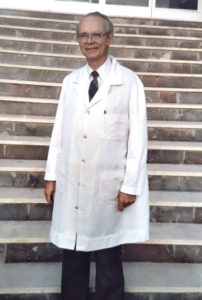
Dr. August Lovegren stands on the steps of Ajloun Baptist Hospital in Ajloun, Jordan. Lovegren served there as a physician.
The almost-centenarian has kept the faith and has unwaveringly trusted in God’s protection through wars and violence in the Middle East, his father’s five-year detainment in China after the rise of communism, and most recently, his younger brother’s death from COVID-19.
August and his late wife, Alta Lee, served with the IMB (then known as the Foreign Mission Board) in Jordan from 1951 to 1987. However, missions has been a part of August’s identity his entire life.
August was born in China in 1921 to missionary parents, Dr. Levi, ‘Lee,’ and Ida Lovegren, who served with a Swedish mission agency in Ya’an, China. Levi’s father immigrated to the U.S. from Sweden.
August’s formative years in China were shaped by his parents’ emphasis on evangelism, Bible readings, Scripture memorization and daily times of prayer.
August says he has memories of sitting in a children’s chair at a Chinese church and singing along to worship songs in Chinese. At 98 years old, after having not lived in China in decades, and after having learned Arabic, August still remembers how to sing “Jesus Loves Me” in Chinese.
At age 7, August and his older sister, Mildred, ‘Millie,’ went to the city of Chengdu to live with a Canadian missionary family so they could attend a Canadian mission school. Millie would later go on to serve with the FMB in East Asia.
The father of one Canadian family August lived with was a medical missionary. August and the doctor’s son decided to become doctors because of the father’s influence.
August lived in China until he was 11, when his family moved back to the U.S.
August says there were two times in his life when he felt an overwhelming sense of the Lord’s presence. The first time was when he was 10 years old and committed his life to Christ. The second instance would come many years later in a Baptist hospital during the Six-Day War.
August and Alta Lee moved to Lebanon in early 1952 to study Arabic. Later, they moved to Ajloun, Jordan, where August served as a doctor in the Ajloun Baptist Hospital. Alta Lee held Bible studies in homes of local families and was active with the women in the community.
During the Six-Day War of 1967, also known as the Arab-Israeli War, FMB personnel evacuated Jordan. August volunteered to stay behind to monitor the hospital and take care of patients.
August wanted to continue to serve the Jordanian people in times of peace and in times of crisis. The Lovegrens loved the Jordanian people and the love was returned. August said during the most difficult times in Jordan and the Middle East, local men and women offered to shelter them in their homes.
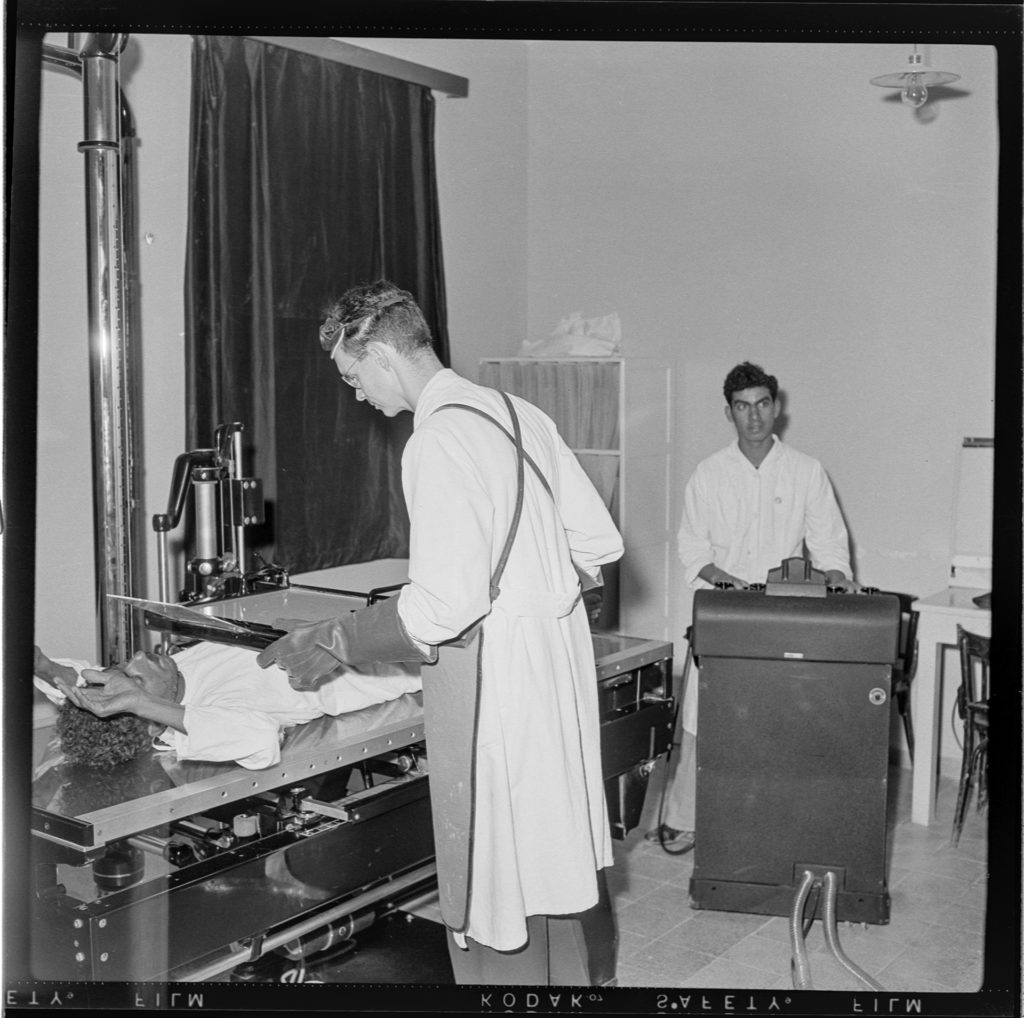
Dr. August Lovegren X-rays a patient in Ajloun Baptist Hospital in Ajloun, Jordan.
During the conflict, August occasionally spent the night in the hospital. One evening, the Lord gave him a vivid confirmation of His protection.
“I seemed to still be awake; it was like a dream came. And across the other side of the room, a large hand appeared,” August says. “There was a person in the middle of the hand, and I looked a little closer, and it was me, in the hand, and I really feel like that was God’s hand trying to reassure me He would take care of me.”
As he considers the tumultuous times he’s lived through, August remarks, “All I know is that the Lord is very faithful in encouraging us and taking care of us over the years. If you trust the Lord, He’ll take care of you and supply your needs.”
August says he and Alta Lee were always where they wanted to be; serving among the Jordanian people.
The Lovegrens moved to Jordan not long after Jordan annexed the West Bank. They were in Jordan during the Arab Cold War, the Six-Day War, Black September and the resulting civil war, the Yom Kippur War, and they lived in Jordan during multiple assassination attempts on the life of King Hussein bin Talal. August remembers having the privilege of hosting His Majesty King Hussein at the Ajloun Hospital in the early days.
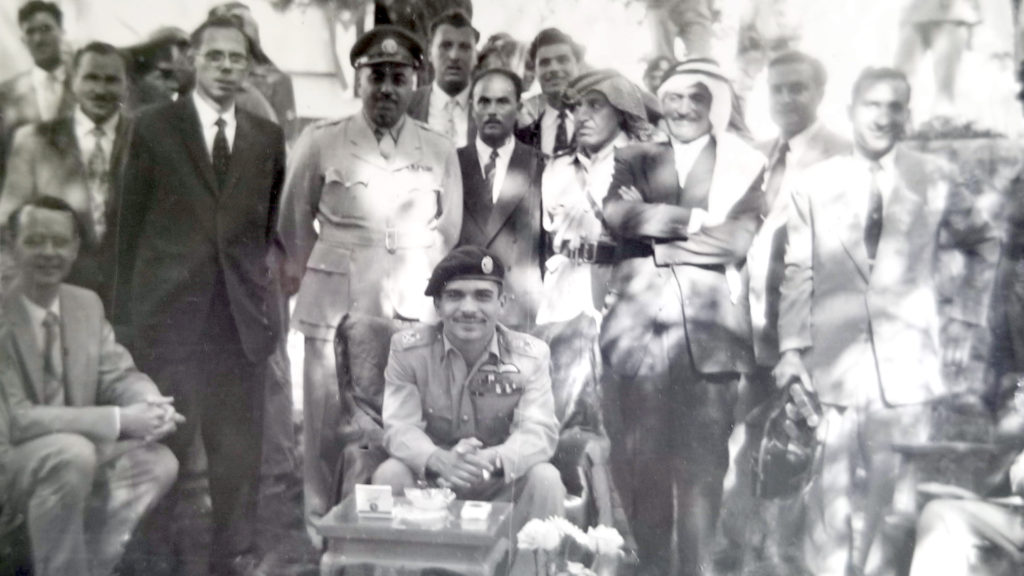
Dr. August Lovegren and staff at the Ajloun Baptist Hospital pose with His Majesty King Hussein bin Talal, the king of Jordan at the time. The hospital received acclaim and recognition for their faithful and dedicated service to Jordanians.
Missionary doctors in the region filled in for one another as doctors took furloughs and when more doctors were needed due to an increase in patients. August traveled to the Gaza Strip, which changed territorial possession several times during the Lovegrens’ tenure. August also spent six months working at Jibla Baptist Hospital in Yemen.
August attributes his dedication and steadfastness in ministry to his parents’ example and how he was raised. They served the Lord gladly and were compelled to go back to China after their children were grown. They had some of their most fruitful years later in life.
After their children were grown, and Levi served in the U.S. Army during World War II, Levi and Ida returned to China as missionaries with the Conservative Baptist Foreign Mission Society. In 1951, Levi was imprisoned by the Chinese Communist government and spent approximately five years in prison.
Upon his release, Levi and Ida set sail on a freighter ship to Jordan to spend time with August and Alta Lee on their way back to the U.S. During their voyage, he read news articles given to him so that he could catch up on world news during his time in prison.
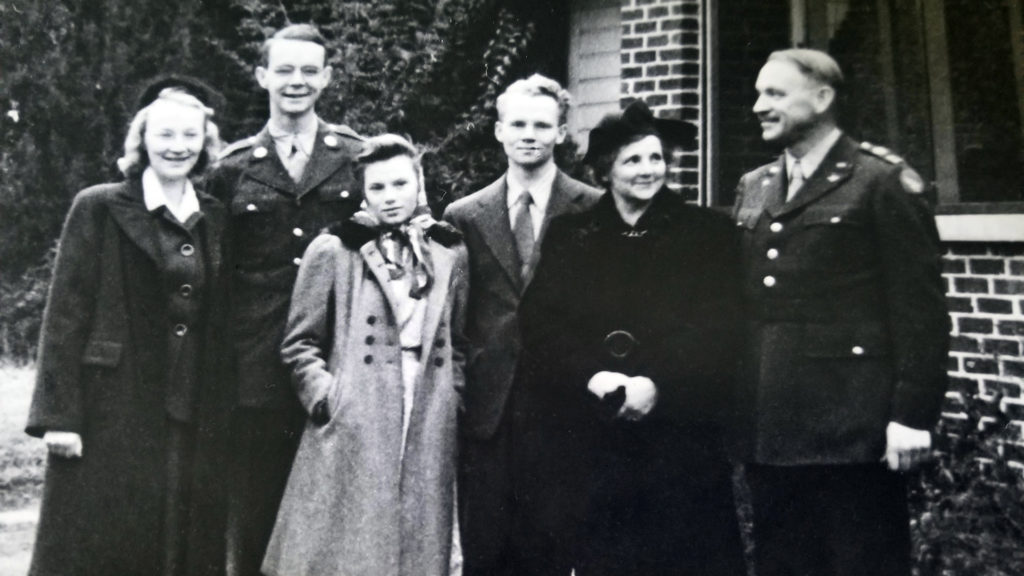
The Lovegren family, Levi, Ida, Millie, August, Norman and Edith, pose for a photo in 1944 before Norman was drafted. Norman passed away on Good Friday, April 10, 2020, from COVID-19. Due to the virus, it was not possible to attend in person, the family viewed the burial service online. Edith, (Edie) Lambert, lives in California and has written two books about her family, one documenting the life of her parents, “Called and Determined: The Story of Lee and Ida Lovegren.”
August and Alta retired in 1987 and moved to Georgia. August continued to use medicine to serve and share the gospel. In his retirement, August made several short-term medical mission trips to Yemen, Jordan and northern Iraq. The Gulf War began as he was traveling to the Middle East, but that didn’t stop him from going — God had called him to serve, and he trusted the Lord would protect him like He had his entire life.
August volunteered at Jibla Baptist Hospital in Yemen on several of his trips to the Middle East. Three IMB missionaries were martyred at the hospital in 2002. The missionaries were close friends of August.
August’s brother, Norman Lovegren, passed away on Good Friday, April 10, 2020, from COVID-19. He was living in an assisted living home in New Orleans. Due to the virus it was not possible to attend in person, but August and his family were able to view the burial service online.
August’s younger sister, Edith, ‘Edie,’ Lambert, lives in California and has written two books about her family. One of the books is called, “Called and Determined: The Story of Lee and Ida Lovegren.”
August lives in an independent living facility in Nashville, Tennessee, and regularly stays in touch with his daughters and with friends who served in the Middle East. They often recount what the Lord did during their time in various places. August said they have a deep bond because of the crises they weathered together.
“The Lord has been kind to take care of us,” August says.
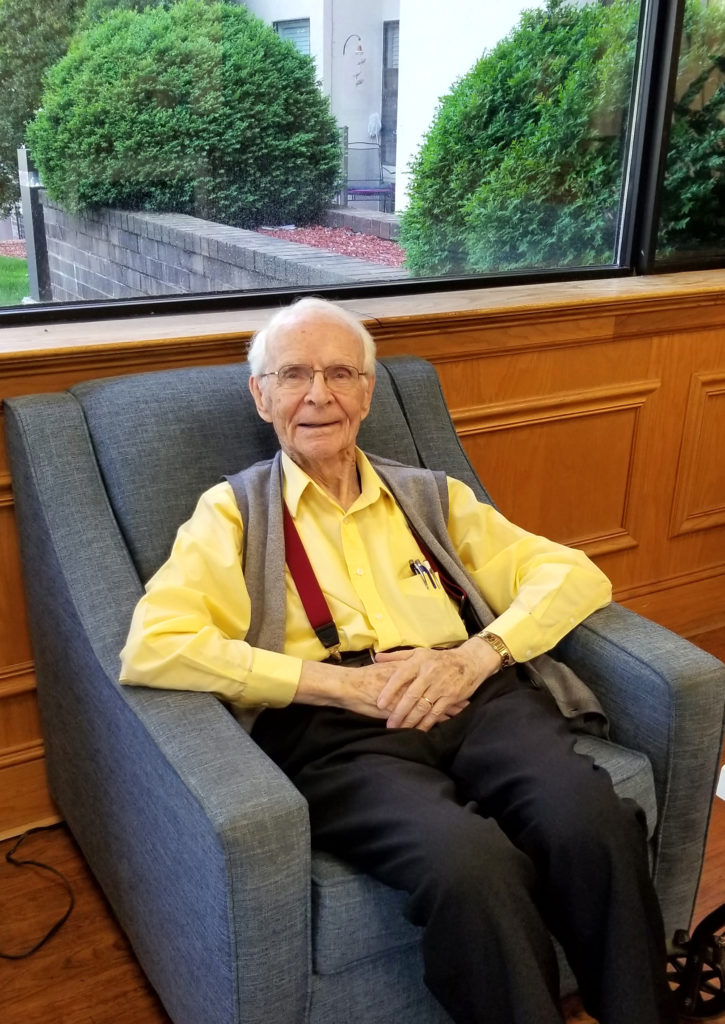
Dr. August Lovegren poses for a photo on Easter Sunday. Lovegren, who is 98, lives in an independent living facility in Nashville, Tennessee.

